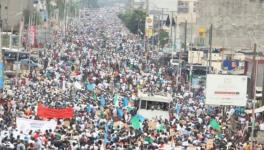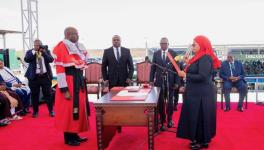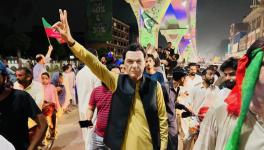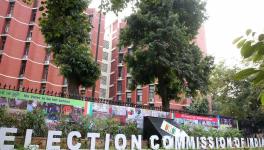Tanzania Elections: Democracy in Crisis Amid Repression
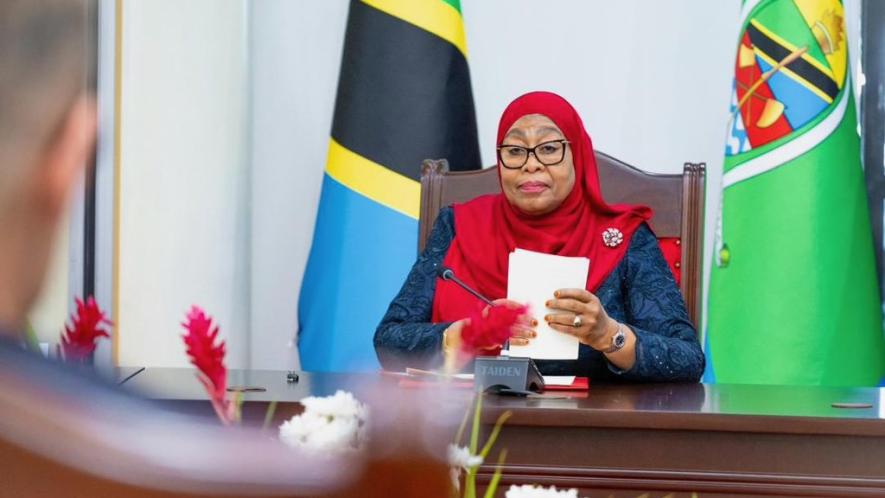
Tanzanian President Samia Suluhu Hassan. Photo: Samia Suluhu/X
As Tanzania heads toward the general elections scheduled for October 28, 2025, the political climate signals not a moment of renewal, but of a tightening grip on power, cracking down on dissent, and escalating public disillusionment. Far from an inclusive, exciting pre-elections season, the lead-up to the election has shown little awareness of the issues facing ordinary people.
Opposition party barred from election
The Independent National Electoral Commission (NEC) in Tanzania officially announced on April 12, 2025 that it would bar the main opposition party, Chama cha Demokrasia na Maendeleo (CHADEMA), from participating in the 2025 general elections as well as any by-elections until 2030.
The reason?
CHADEMA declined to sign a mandatory electoral code of conduct that was required for all parties. Other parties like CCM, ACT-Wazalendo, CUF, CHAUMMA, TLP, and NCCR-Mageuzi signed the code.
CHADEMA had insisted that no elections should happen without comprehensive reforms in electoral laws and processes. Tensions escalated further when CHADEMA’s leader, Tundu Lissu, was arrested and charged with treason and “publishing false information” online. The government accused him of inciting the public to obstruct the electoral process under the party’s banner: “No Reforms, No Elections.”
Kenya civil society delegation detained at the airport
Tanzanian opposition figure Tundu Lissu appeared in court May 19, 2025, to face treason charges. The case has drawn widespread attention locally and internationally, raising serious concerns over political repression and the state of democratic freedoms in Tanzania.
The situation escalated further when the Tanzanian government detained and deported prominent Kenyan opposition leader and lawyer Martha Karua of the People’s Liberation Party, along with a delegation of lawyers who had traveled to observe Lissu’s trial. Tensions deepened after Kenya’s former chief justice, Dr. Willy Mutunga, and his delegation were intercepted and detained by Tanzanian authorities as they attempted to attend the ongoing trial. The delegation’s mission was to observe court proceedings in solidarity and ensure international legal standards were upheld.
Media gagged: dissent criminalized
Of concern also is the freedom of the media, as in 2024 alone, three newspapers were suspended for a month. The Citizen, Mwananchi, and Mwanaspoti – were suspended for 30 days after publishing animated content critical of President Samia Suluhu Hassan, underscoring the shrinking space for dissenting media voices.
Since June of last year, authorities have arbitrarily arrested hundreds of opposition supporters, restricted access to social media, banned independent media outlets, and been implicated in the abduction and extrajudicial killing of at least eight government critics.
Political alternatives?
While CHADEMA and CCM may differ in tone and posture, both parties broadly champion neoliberal economic policies: privatization, deregulation, and market-led development. Their ideological similarities leave many Tanzanians with a hollow sense of political choice.
“The crisis is not just electora – it’s systemic,” says Muhemsi, a member of the Tanzania Socialist Forum. “What CHADEMA is doing is exposing the undemocratic process, but not offering a radical break from the neoliberal framework.”
Alongside brutal repression, the state deploys a subtler strategy: manufacturing consent through soft power. According to Muhemsi, the government heavily invests in entertainers, influencers, and state media to craft an image of unity and progress.
“They’re building a parallel reality,” he explains. “They want people to see calm and development. Meanwhile, the underprivileged majority are sidelined.” This dual strategy – violence on one hand and propaganda on the other – creates a suffocating environment for political imagination from below.
Economic discontent
Alongside public discontent is a worsening economic situation. For Tanzania’s ordinary citizens, small-scale farmers, informal traders, street vendors, and unemployed youth, the cost of living has skyrocketed. Food and fuel prices continue to rise while wages stagnate. Essential services like healthcare and education are increasingly commodified, and strategic sectors like ports have been handed over to foreign investors under government deals.
“People are tired,” Muhemsi states. “Access to dignified work, education, or health has become a privilege. Most ordinary people live in daily struggle while a few elites grow richer.”
He further highlights the fragmented nature of working-class politics:
- Some still support CCM – clinging to its nationalist rhetoric or believing change is slow but ongoing.
- Others back the party opportunistically – hoping for state patronage or political appointments.
- But a growing section feels deeply betrayed – aware that both ruling and opposition elites are detached from everyday realities.
Muhemsi says, “But people know what isn’t working. And they’re looking for alternatives.”
Resistance beyond the ballot
Despite repression, resistance persists. Rural land conflicts such as those involving the Maasai in Ngorongoro and Loliondo have turned deadly. In cities, street vendors continue to resist forced removals.
Grassroots formations, especially among smallholder farmers and informal workers, are organizing. Some are building alternative financial systems around cooperatives to break free from exploitative lending. “There is also growing solidarity,” Muhemsi notes, “among farmers, cooperatives, and land rights activists on addressing the many challenges they face.
What lies ahead?
As Tanzania awaits the 2025 elections, the stakes are high. It remains to be seen what the election campaign period will look like for the opposition, and if grassroots movements will cohere into a broader political force. The state may parade a narrative of stability and development. But beneath that façade lies a country grappling with poverty, tensions, and repression.
Courtesy: Peoples Dispatch
Get the latest reports & analysis with people's perspective on Protests, movements & deep analytical videos, discussions of the current affairs in your Telegram app. Subscribe to NewsClick's Telegram channel & get Real-Time updates on stories, as they get published on our website.












